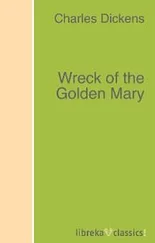Charles Dickens - All The Year Round
Здесь есть возможность читать онлайн «Charles Dickens - All The Year Round» весь текст электронной книги совершенно бесплатно (целиком полную версию без сокращений). В некоторых случаях можно слушать аудио, скачать через торрент в формате fb2 и присутствует краткое содержание. Жанр: Классическая проза, на английском языке. Описание произведения, (предисловие) а так же отзывы посетителей доступны на портале библиотеки ЛибКат.
- Название:All The Year Round
- Автор:
- Жанр:
- Год:неизвестен
- ISBN:нет данных
- Рейтинг книги:3 / 5. Голосов: 1
-
Избранное:Добавить в избранное
- Отзывы:
-
Ваша оценка:
- 60
- 1
- 2
- 3
- 4
- 5
All The Year Round: краткое содержание, описание и аннотация
Предлагаем к чтению аннотацию, описание, краткое содержание или предисловие (зависит от того, что написал сам автор книги «All The Year Round»). Если вы не нашли необходимую информацию о книге — напишите в комментариях, мы постараемся отыскать её.
All The Year Round — читать онлайн бесплатно полную книгу (весь текст) целиком
Ниже представлен текст книги, разбитый по страницам. Система сохранения места последней прочитанной страницы, позволяет с удобством читать онлайн бесплатно книгу «All The Year Round», без необходимости каждый раз заново искать на чём Вы остановились. Поставьте закладку, и сможете в любой момент перейти на страницу, на которой закончили чтение.
Интервал:
Закладка:
Nothing is without its use, and even this odious book may do some service. Not because it coolly claims for the writer and his disciples such powers as were wielded by the Saviour and the Apostles; not because it sees no difference between twelve table rappers in these days, and "twelve fishermen" in those; not because it appeals for precedents to statements extracted from the most ignorant and wretched of mankind, by cruel torture, and constantly withdrawn when the torture was withdrawn; not because it sets forth such a strange confusion of ideas as is presented by one of the faithful when, writing of a certain sprig of geranium handed by an invisible hand, he adds in ecstasies, "WHICH WE HAVE PLANTED AND IT IS GROWING, SO THAT IT IS NO DELUSION, NO FAIRY MONEY TURNED INTO DROSS OR LEAVES" — as if it followed that the conjuror's half-crowns really did become invisible and in that state fly, because he afterwards cuts them out of a real orange; or as if the conjuror's pigeon, being after the discharge of his gun, a real live pigeon fluttering on the target, must therefore conclusively be a pigeon, fired, whole, living and unshattered, out of the gun! — not because of the exposure of any of these weaknesses, or a thousand such, are these moving incidents in the life of the Martyr Medium, and similar productions, likely to prove useful, but because of their uniform abuse of those who go to test the reality of these alleged phenomena, and who come away incredulous. There is an old homely proverb concerning pitch and its adhesive character, which we hope this significant circumstance may impress on many minds. The writer of these lines has lately heard overmuch touching young men of promise in the imaginative arts, "towards whom" Martyr Mediums assisting at evening parties feel themselves "drawn". It may be a hint to such young men to stick to their own drawing, as being of a much better kind, and to leave Martyr Mediums alone in their glory.
As there is a good deal in these books about "lying spirits", we will conclude by putting a hypothetical case. Supposing that a Medium (Martyr or otherwise) were established for a time in the house of an English gentleman abroad; say, somewhere in Italy. Supposing that the more marvellous the Medium became, the more suspicious of him the lady of the house became. Supposing that the lady, her distrust once aroused, were particularly struck by the Medium's exhibiting a persistent desire to commit her, somehow or other, to the disclosure of the manner of the death, to him unknown, of a certain person. Supposing that she at length resolved to test the Medium on this head, and, therefore, on a certain evening mentioned a wholly supposititious manner of death (which was not the real manner of death, nor anything at all like it) within the range of his listening ears. And supposing that a spirit presently afterwards rapped out its presence, claiming to be the spirit of that deceased person, and claiming to have departed this life in that supposititious way. Would that be a lying spirit? Or would it he a something else, tainting all that Medium's statements and suppressions, even if they were not in themselves of a manifestly outrageous character?
Chapter X
The Late Mr. Stanfield
Every Artist, be he writer, painter, musician, or actor, must bear his private sorrows as he best can, and must separate them from the exercise of his public pursuit. But it sometimes happens, in compensation, that his private loss of a dear friend represents a loss on the part of the whole community. Then he may, without obtrusion of his individuality, step forth to lay his little wreath upon that dear friend's grave.
On Saturday, the eighteenth of this present month, Clarkson Stanfield died. On the afternoon of that day, England lost the great marine painter of whom she will be boastful ages hence; the National Historian of her speciality, the Sea; the man famous in all countries for his marvellous rendering of the waves that break upon her shores, of her ships and seamen, of her coasts and skies, of her storms and sunshine, of the many marvels of the deep. He who holds the oceans in the hollow of His hand had given, associated with them, wonderful gifts into his keeping; he had used them well through threescore and fourteen years; and, on the afternoon of that spring day, relinquished them for ever.
It is superfluous to record that the painter of "The Battle of Trafalgar", of the "Victory being towed into Gibraltar with the body of Nelson on Board", of "The Morning after the Wreck", of "The Abandoned", of fifty more such works, died in his seventy-fourth year, "Mr." Stanfield. — He was an Englishman.
Those grand pictures will proclaim his powers while paint and canvas last. But the writer of these words had been his friend for thirty years; and when, a short week or two before his death, he laid that once so skilful hand upon the writer's breast and told him they would meet again, "but not here", the thoughts of the latter turned, for the time, so little to his noble genius, and so much to his noble nature!
He was the soul of frankness, generosity, and simplicity. The most genial, the most affectionate, the most loving, and the most lovable of men. Success had never for an instant spoiled him. His interest in the Theatre as an Institution — the best picturesqueness of which may be said to be wholly due to him — was faithful to the last. His belief in a Play, his delight in one, the ease with which it moved him to tears or to laughter, were most remarkable evidences of the heart he must have put into his old theatrical work, and of the thorough purpose and sincerity with which it must have been done. The writer was very intimately associated with him in some amateur plays; and day after day, and night after night, there were the same unquenchable freshness, enthusiasm, and impressibility in him, though broken in health, even then.
No Artist can ever have stood by his art with a quieter dignity than he always did. Nothing would have induced him to lay it at the feet of any human creature. To fawn, or to toady, or to do undeserved homage to any one, was an absolute impossibility with him. And yet his character was so nicely balanced that he was the last man in the world to be suspected of self-assertion, and his modesty was one of his most special qualities.
He was a charitable, religious, gentle, truly good man. A genuine man, incapable of pretence or of concealment. He had been a sailor once; and all the best characteristics that are popularly attributed to sailors, being his, and being in him refined by the influences of his Art, formed a whole not likely to be often seen. There is no smile that the writer can recall, like his; no manner so naturally confiding and so cheerfully engaging. When the writer saw him for the last time on earth, the smile and the manner shone out once through the weakness, still: the bright unchanging Soul within the altered face and form.
No man was ever held in higher respect by his friends, and yet his intimate friends invariably addressed him and spoke of him by a pet name. It may need, perhaps, the writer's memory and associations to find in this a touching expression of his winning character, his playful smile, and pleasant ways. "You know Mrs. Inchbald's story, Nature and Art?" wrote Thomas Hood, once, in a letter: "What a fine Edition of Nature and Art is Stanfield!"
Gone! And many and many a dear old day gone with him! But their memories remain. And his memory will not soon fade out, for he has set his mark upon the restless waters, and his fame will long be sounded in the roar of the sea.
Chapter XI
A Slight Question of Fact
It is never well for the public interest that the originator of any social reform should be soon forgotten. Further, it is neither wholesome nor right (being neither generous nor just) that the merit of his work should be gradually transferred elsewhere.
Читать дальшеИнтервал:
Закладка:
Похожие книги на «All The Year Round»
Представляем Вашему вниманию похожие книги на «All The Year Round» списком для выбора. Мы отобрали схожую по названию и смыслу литературу в надежде предоставить читателям больше вариантов отыскать новые, интересные, ещё непрочитанные произведения.
Обсуждение, отзывы о книге «All The Year Round» и просто собственные мнения читателей. Оставьте ваши комментарии, напишите, что Вы думаете о произведении, его смысле или главных героях. Укажите что конкретно понравилось, а что нет, и почему Вы так считаете.











